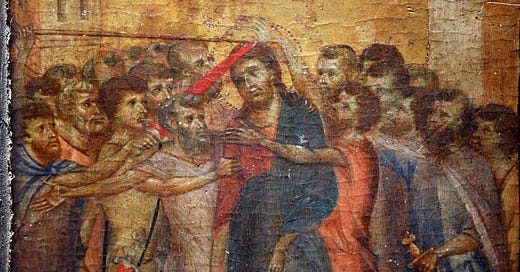A homily for the Seventh Sunday in Ordinary Time, on Luke 6:27-38, delivered over the weekend of February 22-23, 2025.
Today’s gospel reading is perhaps the most difficult passage in Jesus’s great sermon. It calls us to a radical way of love--an unconditional love. It calls us to enlarge our hearts: to make them big enough for God to fit in. To love as God loves. And the key understanding all that is the cross, because Jesus is not asking anything of us that he does not do himself.
Jesus does not call us to be Christians. He calls us to be Christs. Christ means the anointed one. But in his death and resurrection, he extends his life, his anointing, to all of us.
That is what we receive in two of our sacraments of initiation. We’re anointed with oil in baptism, when we are brought into the family of God. Those of you with us today preparing for Confirmation, will be anointed again, sealed in a particular way with the Holy Spirit and strengthened to carry that spirit out into a world that’s hostile to our beliefs. And so all of us, through sacraments of initiation, are anointed ones.
That’s the good news!
Today, Jesus gives us the harder news, which is this: it's not going to be easy. He reminds us of that often. He tells us to remember when the world hates you, that it hated him first. God came to walk among us, and teach us, and show us a new way of being, and in the process, he ate with us, wept with us … and suffered with us. And he suffered at our hands.
That’s what he’s reminding us about in these hard sayings. Turn the other cheek. Let them take your cloak. Give to anyone who asks. Forgive your enemies and pray for them.
Does he want us to allow people to freely abuse us and anyone else? To steal everything from us?
Of course not, because God also wants justice. Loving and praying for someone who wrongs us may mean ensuring that they don’t wrong us again. Jesus doesn’t say we won’t have enemies. In fact, more than once he says that we will.
And so we need to look deeper at his words, because they’re about turning the world upside down and inside out. That’s what we heard last week in the beatitudes, where Jesus said that the poor and the hungry and the sorrowful and the hated are the ones who will be blessed in the Kingdom of God.
To really understand the command to turn the other cheek and give away our cloak, it helps to know a bit about the world of Jesus and the Hebrew scriptures. Rabbis of his time debated these subjects. Jewish law actually had a more serious penalty for slapping someone with the back of your hand than with your palm, because it was considered an insult. And if you turn the other cheek and someone slaps you a second time, how is he going to do it?
With the back of his hand. So we’re not just being struck: we’re being insulted.
The same thing applies to giving away your tunic. A cloak could be used as collateral for a loan, but it had to be returned at night because the borrower needed it to keep warm. If the lender refused, he was violating the law, and giving him your tunic reminded him that he was denying your dignity.
The ability to pray for our enemies shows that we trust in God. It isn’t a call to let evil go unpunished. It’s a call to counter evil with good—to imitate God’s mercy.
That is not the way of the world. The devil has no mercy. And so we conquer him by being his opposite. God doesn’t expect us to tolerate evil endlessly. God hates evil. But He wants evil to turn to good, to accept his mercy, to repent, and to change. And he wants us to be an example of what that looks like.
But if we are to really understand this gospel, we need to look to the crucifixion. There is a reason we’re reading this passage just before Lent. It is a foreshadowing of the passion of Jesus.
Jesus was struck on the face, and did not resist. Jesus was stripped of his cloak and his tunic, and did not resist. Jesus loved his enemies, and prayed for the men who tortured him, as they were torturing him. What he tells us here, he will show us on Good Friday.
And what he tells and shows is how to love as God loves. Radically. A love enough to save the whole world. Our human hearts are just not big enough to do that without help. So he teaches us, using hard images and difficult lessons, so that we may enlarge our hearts to be like his. Big enough to love the good and the bad, the just and the unjust, as much as God loves them.
The Servant of God Dorothy Day once wrote that “Love and ever more love is the only solution to every problem that comes up. If we love enough we will bear each other’s faults and burdens. If we love enough, we are going to light that fire in the hearts of others. And that fire will burn out the sins and hatreds that sadden us.”
We know how evil people can be. We don't need to read the news to know that. Just look at the cross. When Jesus told us what we heard today, he already knew what we were going to do that to him. And still … he prayed, Father, forgive them. They know not what they do.
That was the hardest prayer of all, and it has to be our prayer, too.
Amen.




